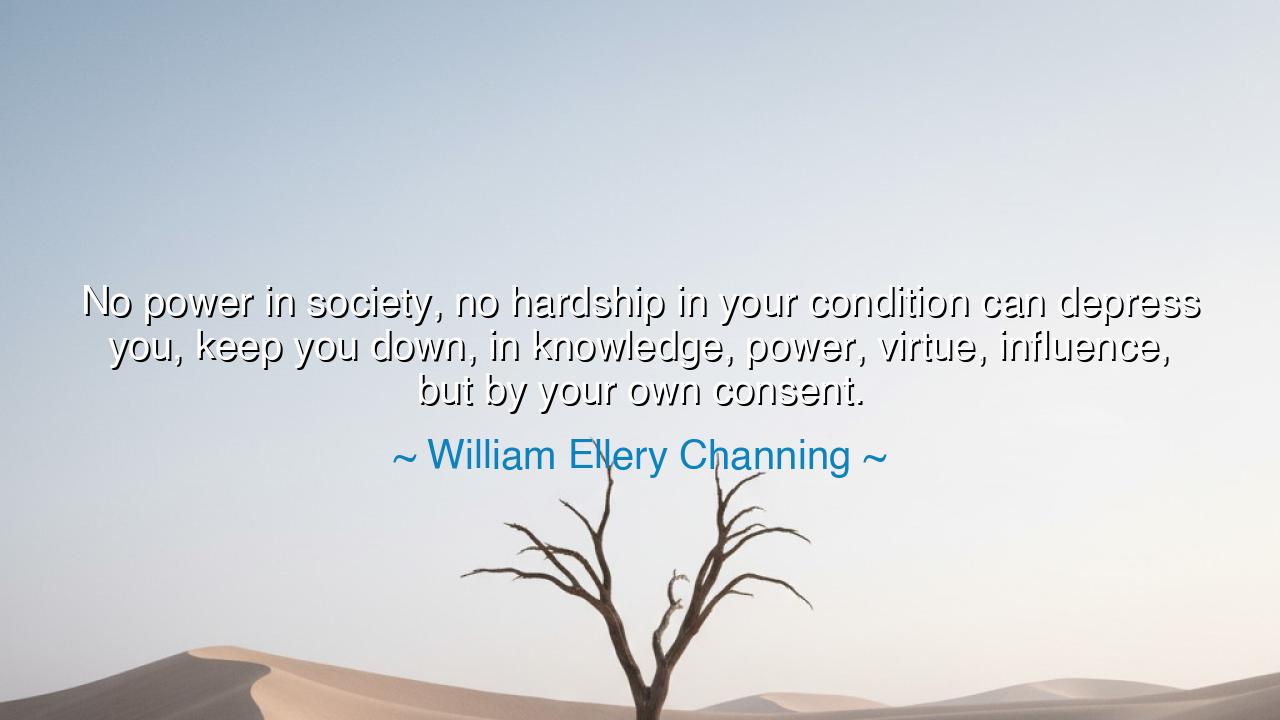
No power in society, no hardship in your condition can depress
No power in society, no hardship in your condition can depress you, keep you down, in knowledge, power, virtue, influence, but by your own consent.






William Ellery Channing, the great preacher of the American pulpit, spoke words that burn like fire upon the conscience: “No power in society, no hardship in your condition can depress you, keep you down, in knowledge, power, virtue, influence, but by your own consent.” In this declaration lies the ancient truth of human dignity—that though chains may bind the body, though poverty may starve the stomach, though injustice may surround the soul, the inner citadel of the human spirit cannot be conquered without its own surrender.
The meaning is radiant and severe. Society may array itself against you, but it cannot steal your inner greatness unless you yield it. Hardship may press upon your path, but it cannot rob you of virtue unless you abandon it willingly. Even when stripped of wealth, position, and safety, you retain the unassailable treasures of knowledge, power, and influence if you refuse to consent to despair. Channing’s words are a call to heroic endurance: that no external force can truly defeat a human being who has not first surrendered inwardly.
This wisdom has its roots in the storms of Channing’s own era. He lived in the early nineteenth century, when America was torn by slavery, inequality, and the struggle for justice. As a Unitarian minister, he preached the dignity of every soul, teaching that no man was born to be another’s property. His words were forged in a time when many were crushed beneath the weight of systems designed to keep them silent and low. Yet he proclaimed that within every individual lay a sovereignty that no master could own: the sovereignty of consent, of the will that chooses not to bow in spirit, no matter how the body is bound.
History offers many examples of this unconquerable truth. Consider Frederick Douglass, born enslaved, denied the right to read, denied the dignity of free manhood. Yet he refused his consent to ignorance. He secretly learned his letters, devoured books, and taught himself to think and to speak with eloquence that shook the halls of power. Society tried to keep him down, hardship marked every step of his youth, yet he rose into knowledge, power, virtue, and influence, precisely because he never surrendered the sovereignty of his own will.
The ancients, too, testified to this law. The Stoic philosopher Epictetus, once a slave, taught that the tyrant can bind your limbs, but cannot touch your mind unless you yield it. He declared that freedom is found not in outward condition but in inward mastery. In this, he spoke the same truth as Channing: that the soul is free by nature, and no oppression, however fierce, can master it unless the soul itself bows in consent.
The lesson is both uplifting and demanding. You cannot always change your condition, but you can always guard your consent. Do not give your agreement to despair, to ignorance, to vice. Do not surrender your dignity to those who scorn it. Refuse to yield your pursuit of knowledge, for it will arm you. Refuse to abandon virtue, for it will sustain you. Refuse to relinquish your influence, for even in silence your example can inspire others. When you withhold consent, you preserve the flame of your humanity, and that flame can outlast every storm.
So what must you do? Cultivate strength of mind and spirit. When hardship comes, say to yourself: This may wound me, but it cannot own me. When society seeks to define you, remember that its chains are powerless if you refuse them your consent. Build your knowledge daily, act with virtue, speak with influence, and walk in your true power. In this way, you will live the truth of Channing’s words, not as a fragile victim of circumstance, but as a sovereign soul.
Thus, remember always: “No power in society, no hardship in your condition can depress you … but by your own consent.” Carry this as a shield within you. For the world may rage and the night may be long, but as long as you withhold your consent, your spirit stands unconquered, and you remain the master of your own destiny.






AAdministratorAdministrator
Welcome, honored guests. Please leave a comment, we will respond soon